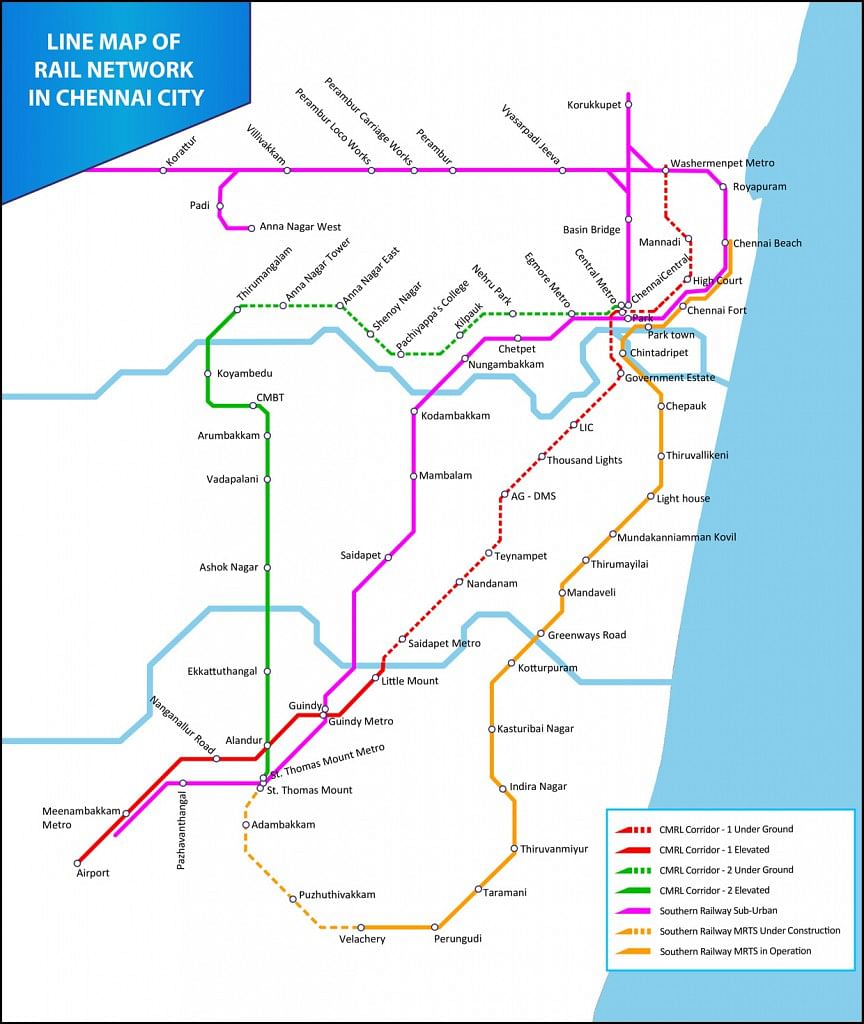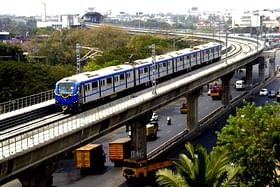This move aims to cater to future demand, improve train frequency, ease congestion during peak hours, and provide additional facilities.
Chennai Metro Rail Ltd (CMRL) plans to introduce 28 six-coach trains in the 54 km Phase-I and Phase-I extension network within three years.
The total cost of these facilities is estimated to be around Rs 2,800 crore.
A consultant recently conducted a study for Chennai Metro Rail to analyse the need for additional six-coach trains and ways to enhance train frequency.
Experts conducted a field-level survey of traffic volume in ten locations, the traffic pattern of public and private transport, and the mode of transport with the highest passenger trips for the study.
According to the study, Chennai Metro Rail witnessed a 156 per cent increase in the number of passengers between January and December 2022. The number of passengers rose from 25.2 lakh to 64.1 lakh.
The trains currently carry about 2.5 lakh passengers on weekdays during the 19-hour operation, with heavy crowds during peak hours.
Presently, 52 trains are available for Phase-I operations, out of which 45 are in passenger services, and the rest are kept as backups. The study suggests that only additional trains can increase train frequency and reduce congestion during peak hours.
The study warns that managing the existing frequency during Phase-II operations will be challenging and may result in overcrowding, causing difficulties for commuters in some stretches.
This situation can also affect the potential rise in patronage. Therefore, the study recommends ordering six-coach trains, to be used during peak hours, while four-coach trains can operate during off-peak hours.
To procure additional trains, the authorities must construct several key facilities. These include expanding the depot to accommodate more trains, augmenting platform screen doors in underground stations, extending the length of platforms at stations such as Sir Theagaraya College and Tondiarpet, and providing passenger information systems, announcement systems, and signages.
The authorities will also need to build approximately 15 stabling lines to house 28 to 30 six-coach trains. Additionally, they may need to create test track lines, a heavy washing line, an automatic train wash plant, and other necessary facilities.
CMRL officials state that the state government’s high-level committee must approve the project before it can be forwarded to the Department of Economic Affairs for funding.
“An international bank has informally agreed, but we need to begin the official process. By the time we get the clearances, float the tender for this project and the trains are delivered, it is likely to take about three years,” said an official, reports The Hindu.
This move aims to cater to future demand, improve train frequency, ease congestion during peak hours, and provide additional facilities.
Chennai Metro Phase-I
Phase-I of the Chennai Metro Rail project covers a length of 45.046 km network and consists of two corridors — Corridor-I from Washermenpet to Airport (23.085 km) and Corridor-2 from Chennai Central to St Thomas Mount (21.961 km).
About 55 per cent of the corridors in Phase-I are underground and the remaining are elevated. Out of 32 stations 13 are elevated and the remaining 19 are underground. Inter-corridor interchange stations are available in Alandur (elevated) and Chennai Central (underground) respectively.
With a budget of Rs 14,600 crore, the Phase-I project work began more than 10 years ago. It was completed in stages, with the last portion from AG-DMS to Washermanpet opening to the public in 2019.

The first segment of the section between Alandur to Koyambedu was commissioned on 29 June 2015.


